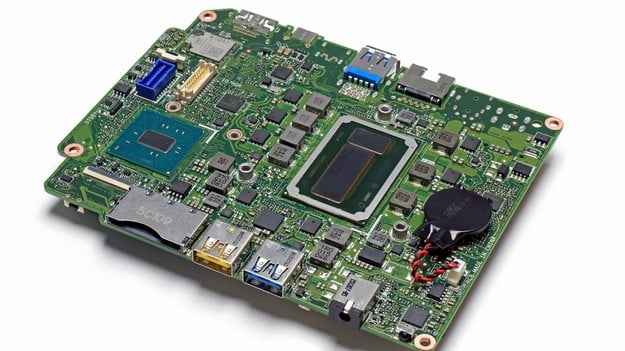In case there were any questions, yes, the new Skull Canyon NUC is still palm-sized, though admittedly my geek paw is larger than most. It's still a petite little beastie, however, measuring just under an inch thick. In reality, it trades a fair amount of it's brethren
NUC's height, for a bit more width; it's maybe another third so so wider. Regardless, though it may be tempting to wedge the device in on a bookshelf or component rack somewhere, vertically, the chassis is designed to lay horizontally on a flat surface for proper venting.



The bottom of the NUC6i7KYK has four thick rubber anti-skid standoffs that raise the system up off the surface its on and keep it stable. There's also an intake venting area underneath here, while exhaust vents from the internal squirrel cage are located on the rear of the device. On the rear IO panel you can see there's a power jack, optical output, a Gigabit Ethernet port, two USB 3.0 ports, a mini DisplayPort, a
Thunderbolt 3 port and a full sized HDMI 2.0 port. The front face of the unit is home to the power button, IR receiver, headphone jack, two more USB 3.0 ports and the SD card slot.

Pulling four Philips head screws off the bottom gives you access to the main PCB area as well as the Skull Canyon NUC's two M.2 PCIe slots and SODIMM sockets. Incidentally, those dual M.2 slots can support RAID mode and there is a RAID setting in this NUC's BIOS. Also, that Thunderbolt 3 port supports external graphics like the Razer Core graphics enclosure. In fact, at an Intel even recently held in San Francisco, the Skull Canyon NUC was seen
powering a Razer Core while gaming quite deftly in Just Cause 3.

Bet you didn't think we'd tear down this shiny, new
Skull Canyon NUC6i7KYK, but guess again. Once you get past a few more screws inside and pull off the side IO trim plate, the entire motherboard assembly is not that hard to remove. so long as you take care not to damage the heat pipe assembly hanging off of it. That heat pipe setup comes off pretty quickly with three more screws as well, but let's take a bit more of a stroll around.


In the top shot above you can see Intel's Wireless-AC 8260 WiFi adapter (802.11ac, dual-band WiFi with Bluetooth 4.2), with its antenna wires removed and metal shielding covering the circuit area. The next shot down is a look at the new NUC's IO Southbridge H170 PCH (Platform Controller Hub) that offers PCIe links for IO devices like GbE, USB 3, Thunderbolt 3, HD Audio and M.2 slots, among other things.


Ahh, but there's the Skylake heart of this beastly NUC. Up close and personal, here you can see that the chip is actually based on what's known as a multi-chip module packaging. The larger horizontally orientated die is the quad-core
Skylake Core i7-6770HQ CPU and integrated graphics die with on board memory controller and PCIe links. The second die on the right is the external 128MB eDRAM chip. This DRAM cache specifically supports the 72 Execution Unit Intel Iris Pro Graphics 580 GPU on board the processor, for low latency, high bandwidth local memory access. In combination, it offers significantly more punch for the Intel integrated graphics solution on board this NUC.
Now that you know what makes the new Intel Skull Canyon NUC6i7KYK tick, why don't we just, well, make it tick?















